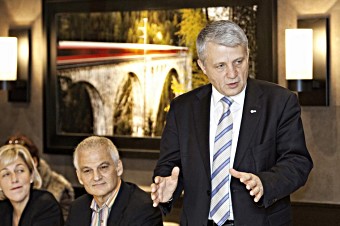
David Ferreira
Former Managing Director, Innovative Finance, GAVI Alliance
I have long believed that a group of committed people can accomplish almost anything.
 I saw it in my native South Africa. I have seen it in my work for the GAVI Alliance, which in just over a decade has helped immunise 326 million children and save more than 5.5 million lives. And, in Davos, Switzerland, I was privileged to have breakfast with a group of very committed people.
I saw it in my native South Africa. I have seen it in my work for the GAVI Alliance, which in just over a decade has helped immunise 326 million children and save more than 5.5 million lives. And, in Davos, Switzerland, I was privileged to have breakfast with a group of very committed people.
In the past year, a handful of visionary government and business leaders have stepped forward to create an unusual partnership that could save millions of lives over the next few years. That partnership is the Gavi Matching Fund.
Under the GAVI Matching Fund, the British government and the Bill & Melinda Gates Foundation have pledged about US$ 130 million combined (GBP 50 million and US$ 50 million, respectively) to match contributions to GAVI from corporations, foundations and other organizations, as well as from their customers, employees and business partners.
The goal – including the match – is to raise US$ 260 million for immunisation by the end of 2015, bringing us much closer to ensuring that GAVI can help immunise 225 million children and save 3.9 million lives over that period.
This programme has shone a light on an increasing number of private sector champions for global health. They range from financial services firms such as JP Morgan and the Spanish bank “la Caixa” (through its foundation), to prominent global enterprises such as Anglo American and nimble, creative foundations such as Comic Relief, Absolute Return for Kids (ARK) and the Children’s Investment Fund Foundation (CIFF).
Collectively, these champions are contributing their voices, skills and financial resources to the fight for child immunisation in the world’s poorest countries. This is a model that works. The GAVI Matching Fund was launched in June 2011 and in just a few months has already raised around US$ 40 million for immunisation.
This new model was an important theme that at the breakfast I attended in Davos, where the World Economic Forum is holding its annual meeting. The gathering literally was a “breakfast of champions.” There, several GAVI Matching Fund partners and other global business leaders met with Andrew Mitchell, the British Secretary of State for International Development and Bill Gates.
They spoke convincingly of how a public-private partnership can succeed, whether through Comic Relief raising funds from the general public for global health, “la Caixa” organising business partners to help fund the roll-out of vaccines in Central America, or companies offering their technologies and core business skills to save lives.
For instance, the same know-how that gets soft drinks to remote areas of Africa could help the countries that GAVI supports deliver vaccines to those areas. Or cellphone technology could be used to efficiently monitor the use of vaccines.
Even a US$ 3 million donation – matched by the British Government or the Gates Foundation – would buy enough vaccine to immunise more than 500,000 children this year against pneumococcal disease, one of the main causes of death from pneumonia. Or nearly a million children against potentially fatal diarrhoea caused by rotavirus.
The GAVI Matching Fund is an example of what can be achieved when governments, corporations, foundations and the general public work together to solve difficult problems, such as the inequity in the availability of vaccines for children living in poor countries. It represents a rare chance to be part of something guaranteed to change the lives of millions of people for the better.
It represents a new era of champions for public health.
